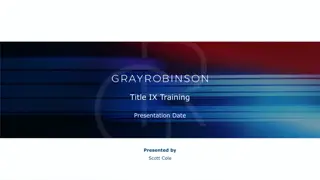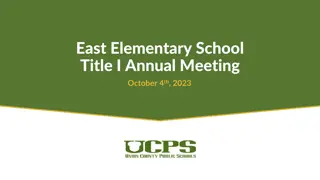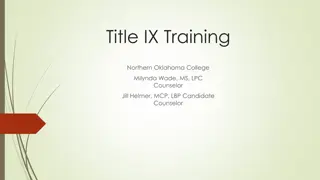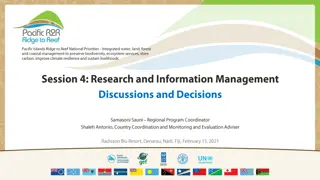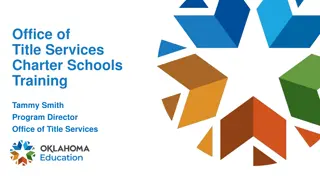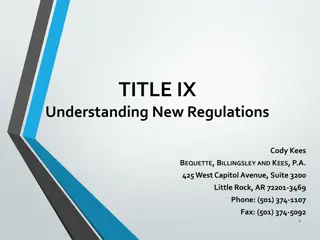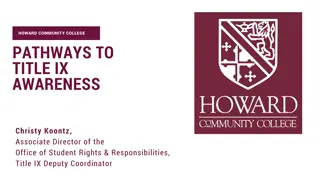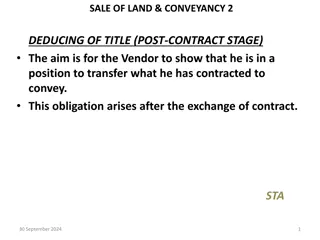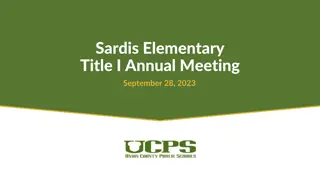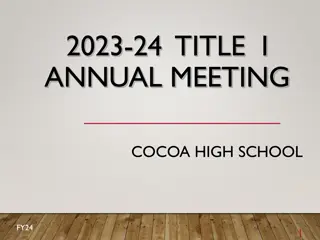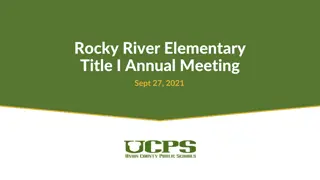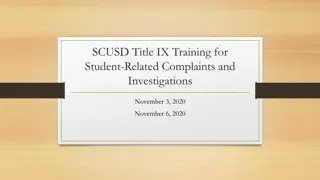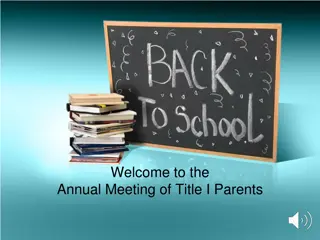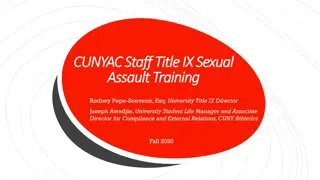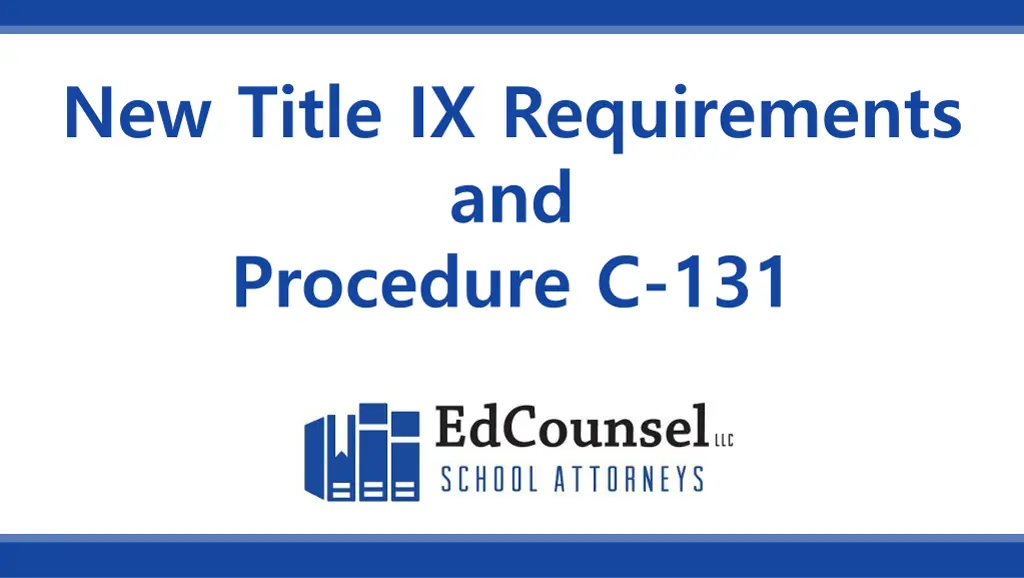
Understanding New Title IX Requirements and Procedures C-131
Learn about the recent updates in Title IX regulations effective August 2020, including key procedural changes and comparisons between old and new guidelines, along with the basic steps outlined for handling sexual harassment complaints in educational settings.
Download Presentation

Please find below an Image/Link to download the presentation.
The content on the website is provided AS IS for your information and personal use only. It may not be sold, licensed, or shared on other websites without obtaining consent from the author. If you encounter any issues during the download, it is possible that the publisher has removed the file from their server.
You are allowed to download the files provided on this website for personal or commercial use, subject to the condition that they are used lawfully. All files are the property of their respective owners.
The content on the website is provided AS IS for your information and personal use only. It may not be sold, licensed, or shared on other websites without obtaining consent from the author.
E N D
Presentation Transcript
New Title IX Requirements and Procedure C-131
New Title IX Regulations Effective August 14, 2020 Numerous procedural changes District will need to adopt policy C-131-P or Title IX . District will need to incorporate the new policy into the Student Handbook, Employee Manual, and the Administrator Manual.
Some Comparisons of Old to New 2001/2017 Prior Department Guidance New Regulations Conduct = so severe, persistent, or pervasive Conduct = so severe, pervasive, and objectively offensive Knowledge = The school district knows or reasonably should know of the conduct Knowledge = The school district has actual knowledge of the conduct
Some Comparisons of Old to New 2001/2017 Prior Department Guidance New Regulations It may be appropriate for a school to take interim measures during the investigation of a complaint Supportive measures must be offered once a school has actual knowledge of sexual harassment allegations Decision-maker cannot be same person as Title IX Coordinator or Investigator Decision-maker can be same person as Title IX Coordinator or Investigator A school may offer the right to appeal a responsibility determination A school must offer the right to appeal a responsibility determination
Basic Steps Outlined in the New Regulations District or school receives actual knowledge of conduct that may constitute sexual harassment committed by a student or employee. District-level or school-based Title IX Coordinator meets with alleged victim to discuss supportive measures and the process for filing a formal complaint. Investigator leads the investigation after the formal complaint is in place and written notice is given to the involved individuals and their parents/guardians. A decision-maker issues a decision regarding responsibility, which can be appealed by either party.
Select Definitions Actual Knowledge Notice of sexual harassment or allegations of sexual harassment under Title IX to any employee of the district, except where the only district official or employee with actual knowledge is also the respondent. The district has actual knowledge when an employee witnesses the conduct, hears about the conduct, or receives a written report about the conduct from anyone.
Select Definitions Sexual harassment under Title IX is conduct on the basis of sex within the scope of the district's education programs or activities that satisfies one or more of the following: An employee of the district conditioning the provision of an aid, benefit or service of the district on an individual's participation in unwelcome sexual conduct; Unwelcome conduct determined by a reasonable person to be so severe, pervasive and objectively offensive that it effectively denies a person equal access to the district's education program or activity; or "Sexual assault" as defined in 20 U.S.C. 1092(f)(6)(A)(v), "dating violence" as defined in 34 U.S.C. 12291(a)(10), "domestic violence" as defined in 34 U.S.C. 12291(a)(8) or "stalking" as defined in 34 U.S.C. 12291(a)(30).
Select Definitions Sexual assault is an offense classified as forcible or nonforcible sex offense under the uniform crime reporting system of the Federal Bureau of Investigation.
Select Definitions Sexual offenses are any sexual act directed against another person, without consent of the victim, including instances where the victim is incapable of giving consent, and unlawful sexual intercourse. This includes rape, sodomy, sexual assault with an object, fondling, incest, statutory rape, and failure to register as a sex offender.
Select Definitions Dating violence is violence committed by a person who is or has been in a social relationship of a romantic or intimate nature with the victim. The existence of such a relationship shall be determined based on a consideration of the following factors: The length of the relationship The type of relationship The frequency of interaction between the persons involved in the relationship.
Select Definitions Domestic violence is a felony or misdemeanor crime of violence committed by: A current or former spouse or intimate partner of the victim, by a person with whom the victim shares a child in common; A person who is cohabitating with or has cohabitated with the victim as a spouse or intimate partner; A person similarly situated to a spouse of the victim under the domestic or family violence laws of Missouri; or Any other person against an adult or youth victim who is protected from that person s acts under the domestic or family violence laws of Missouri.
Select Definitions Stalking is engaging in a course of conduct directed at a specific person that would cause a reasonable person to: Fear for his or her safety of others; or Suffer substantial emotional distress.
Select Definitions Formal Complaint A document or electronic submission filed by the complainant or signed by the Title IX coordinator alleging sexual harassment under Title IX against a respondent and requesting that the district investigate the allegations. When a complainant files a formal complaint, the document or electronic submission must have the complainant's physical or digital signature or otherwise indicate the complainant's identity. A formal complaint may be filed only by a complainant participating in or attempting to participate in the district's education programs or activities and must have occurred against the complainant in the U.S. When the Title IX Coordinator signs the complaint, the Coordinator is not a complainant or party.
Reporting Requirements Any person may report sexual harassment regardless of whether the person is the alleged victim (complainant). However, all Board members, employees, students, and visitors who have witnessed, heard about, or received a report about any incident or behavior that could constitute sexual harassment under this policy must immediately report such incident or behavior to the District s Title IX Coordinator for investigation. If the allegations are against the District s Title IX Coordinator, it must be immediately reported to the Superintendent, unless the Superintendent is also the Title IX Coordinator, then to the President of the Board of Education. Reports may be made at any time, including during nonbusiness hours, by using the telephone number, email address or office address listed below.
Intake and Classification of Reports The Title IX coordinator will receive and review all reports of sexual harassment even if a formal complaint has not been filed. If the Title IX coordinator determines that the report concerns conduct that does NOT involve sexual harassment under Title IX as that term is defined in this policy or did not occur in the district's education program or activity, the Title IX coordinator will use the grievance process in policy C-130-P or forward the complaint to the individual responsible for implementing such policy.
Basic Steps If a school has actual knowledge of sexual harassment allegations, the school must respond promptly and in a manner that is not deliberately indifferent (i.e., not clearly unreasonable in light of the known circumstances ). A school must offer supportive measures to the alleged victim (complainant) and follow a grievance process that meets certain minimum requirements before imposing discipline or other actions that are not supportive measures against an alleged perpetrator (respondent). District must provide the victim with written notice of the meeting with sufficient time for the complainant to prepare to participate. (Form D) A school may not continue with the grievance process in the absence of a formal complaint.
Supportive Measures Supportive Measures are non-disciplinary, non-punitive individualized services offered as appropriate, as reasonably available, and without fee to the complainant or respondent before or after filing a formal complaint or where no formal complaint is filed. Designed to restore or preserve equal access to the district s education program or activity without unreasonably burdening the other party, including measures designed to protect the safety of all parties or the district s educational environment, or deter sexual harassment. If the District does not provide complainant with supportive measures, the District must document the reasons why such response was not clearly unreasonable in light of the known circumstances.
Supportive Measures (cont.) Supportive Measures may include: Counseling Extensions of deadlines or other course- related adjustments Modifications of work or class schedules Campus escort services Mutual restrictions on contact between parties Changes in work or housing locations Leaves of absence Increased security or monitoring of certain areas of the campus
Removal of Respondent The district is not precluded from removing a Respondent from the education program or activity on an emergency basis, provided that the district: Undertakes an individualized safety risk and analysis Determine that an immediate threat to the physical health or safety of any student or other individual rising from the allegations of sexual harassment justifies removal; and Provides the Respondent with notice and an opportunity to challenge the decision immediately following the removal. The requirement of supportive measures does not preclude the district from placing an employee on administrative leave during the grievance process. Keep in mind disciplinary requirements under policy and state law as you work through this process.
Procedures Prior to or without a Formal Complaint When the Title IX coordinator has actual knowledge of an allegation of sexual harassment under Title IX in an education program or activity of the district, the Title IX coordinator will promptly contact the complainant and: Provide written notice of the meeting with sufficient time for the party to prepare. Provide information about the supportive measures available to the complainant and inform the complainant that he or she may receive supportive measures without filing a formal complaint. Consider the complainant's wishes with respect to supportive measures and implement appropriate supportive measures. Explain to the complainant the process for filing a formal complaint. (Form A)
In Absence of Formal Complaint If no formal complaint is filed by the complainant or signed by the Title IX coordinator, no disciplinary action will be taken against the respondent on the grounds of sexual harassment under Title IX.
The Formal Complaint Process The complainant may file a formal complaint or choose not to file a formal complaint and simply receive the supportive measures. If the complainant does not file a formal complaint, the Title IX coordinator may sign a formal complaint initiating the grievance process. The Title IX coordinator will do so only if initiating the grievance process against the respondent is not clearly unreasonable in light of the known circumstances.
Identify the Roles Since multiple individuals are needed to fill the roles in the process, it is important to establish the roles at the onset. Title IX Coordinator can be the investigator. Decision-maker must be someone other than the Title IX Coordinator or Investigator. Appeal decision-maker cannot be the same person as the decision-maker, the investigator, or Title IX Coordinator. Title IX has specific training requirements for individuals filling these roles, which will be covered by this training.
Confidentiality The district must keep confidential (except as permitted by FERPA, as required by law, or to carry out the purpose of Title IX) the identity of any individual who has made a report or filed a formal complaint, including: Any individual who has made a report or filed a formal complaint A complainant An individual who has been reported to be the perpetrator of sexual harassment A respondent Any witness.
Timeline Under C-131, the district generally has 15 calendar days to complete the investigation and 45 calendar days after sending the notice of Formal Complaint to the parties to make a determination regarding responsibility. A temporary delay to this process or a limited extension of time frames for good cause is allowed. Good cause may include: Absence of a party, a party s advisor, or a witness; Concurrent law enforcement activity; or The need for language assistance or accommodation of disabilities. The district must provide written notice to the complainant and respondent of the delay or extension and the reasons for the action.
Notice to the Parties (Form B) When the complainant files a formal complaint, written notice will be provided to all known parties and will include: Notice of the grievance process, including any informal resolution process that is available and the timeline for such process. Notice of the allegations of sexual harassment under Title IX made by the complainant with sufficient details known at the time and with sufficient time to allow the respondent to prepare before the initial interview. At a minimum, the details will include the identities of the parties involved in the incident, if known, the conduct and the date and location of the alleged incident if known. A statement that the respondent is presumed not responsible for the conduct and that a determination of responsibility will be made at the conclusion of the grievance process.
Notice to the Parties (cont.) A statement that parties may have an advisor of their choice, who may be an attorney. A statement that the parties and their advisors will have an equal opportunity to inspect and review any evidence that is directly related to the allegations raised in the formal complaint, including evidence upon which the district does not intend to rely, so that each party can meaningfully respond to the evidence prior to conclusion of the investigation. Notice of any provision in the district's discipline code that prohibits knowingly making a false statement or providing false information during the grievance process. If in the course of the investigation of sexual harassment under Title IX the district decides to investigate allegations about the complainant or respondent that were not in the initial notice, notice of the additional allegations will be provided to all known parties.
Dismissal of the Formal Complaint If the district determines that the allegations, even if proved: would not constitute sexual harassment under Title IX as defined in this policy, did not occur in the district's education program or activity, or were not committed against a person in the United States, then the formal complaint will be dismissed. The dismissal does not mean that a complaint cannot be made under another district policy or that any misbehavior will not be addressed under another policy or the district's code of conduct. The district may dismiss a formal complaint or any allegations in a formal complaint at any time if: The complainant notifies the Title IX coordinator in writing that the complainant would like to withdraw the formal complaint or any allegations in the formal complaint; The respondent is no longer enrolled in or employed by the district; or Specific circumstances prevent the district from gathering evidence sufficient to reach a determination of responsibility based on the merits of the formal complaint or allegations therein.
Dismissal of the Formal Complaint (cont.) If the formal complaint is dismissed, the District will promptly send written notice of the dismissal and the reason(s) therefor simultaneously to the parties. (Form C) Either party may appeal within 5 calendar days of the dated dismissal letter. If the Title IX coordinator or the investigator dismissed the complaint, the dismissal will be heard by the decision-maker. If the decision-maker dismissed the complaint, the dismissal will be heard by the appellate decision-maker. The appeal is limited to the following bases: There was a procedural irregularity that affected the outcome. There is new evidence that was not reasonably available at the time the dismissal was made that could affect the outcome of the matter. The Title IX coordinator, investigator or decision-maker had a conflict of interest or bias for or against complainants or respondents generally or an individual complainant or respondent that affected the outcome of the matter.
Title IX Grievance Process upon Filing of a Formal Complaint The district's grievance process will provide a prompt and equitable resolution of complaints and will: Treat complainants and respondents equitably by providing remedies to a complainant where a determination of responsibility for sexual harassment has been made against the respondent; Comply with Title IX regulations before imposing any disciplinary sanctions or other actions that are not supportive measures against a respondent; Not restrict the ability of either party to discuss the allegations or to gather and present relevant evidence. Provide equal opportunities for the parties to present witnesses and other inculpatory and exculpatory evidence. Require a decision-maker to objectively evaluate all relevant evidence, including both inculpatory and exculpatory evidence, and not make credibility determinations based on a person's status as a complainant, respondent or witness;
Title IX Grievance Process upon Filing of a Formal Complaint (cont.) Require that all Title IX coordinators, investigators, those responsible for facilitating informal resolution processes and decision-makers not have a conflict of interest or bias for or against complainants or respondents generally or an individual complainant or respondent; Presume that the respondent is not responsible for the conduct until a determination of responsibility is made at the conclusion of the grievance process; Not require, allow, rely upon or otherwise use questions or evidence that constitutes, or seeks disclosure of, information protected under a legally recognized privilege unless the person holding such privilege has waived the privilege. Provide the parties with the same opportunities to have others present during any proceeding, including the opportunity to be accompanied to any related meetings by an advisor of their choice and do not limit the choice or presence of an advisor for either party in any meeting or proceeding. The district may establish restrictions regarding the extent to which the advisor may participate if restrictions apply equally to the parties.
Title IX Grievance Process upon Filing of a Formal Complaint (cont.) Evidence Considerations The standard of evidence used to determine responsibility is the preponderance of the evidence standard. (i.e. it is more likely than not that the sexual harassment occurred) The burden of proof is on the district as well as the burden of gathering evidence sufficient to reach a determination rests on the parties. The district may not require, allow, rely upon or otherwise use questions or evidence that constitute, or seek disclosure of, information protected under a legally recognized privilege, unless the person holding such privilege has waived the privilege. Credibility determinations may not be based on a person s status as a complainant, respondent, or witness. There must be an objective evaluation of the evidence.
Basic Steps Outlined in the New Regulations for Investigations Investigator gathers and reviews evidence, and prepares an investigative report; the involved individuals and their parents/guardians review and respond to the report. Decision-maker provides opportunity for involved individuals and their parents/guardians to prepare written questions to be answered by the other side and any witnesses. Decision-maker reviews all materials and makes a written responsibility determination an impartial determination as to whether the alleged conduct occurred including sanctions.
Investigation Process During the investigation and the grievance process, the district will: Provide written notice to parties who are invited or expected to participate of the date, time, location, participants and purpose of all hearings, investigative interviews or other meetings 5 calendar days before the date of participation for the parties to prepare to participate. (Form D) Obtain written, voluntary consent before accessing records, such as medical records or counseling notes, that a physician, psychiatrist, psychologist or other recognized professional or paraprofessional made or maintained in connection with the provision of treatment to the party. If the party is at least 18 years old or is enrolled in postsecondary education, the party can sign on his or her own behalf. Otherwise, a parent/guardian must sign on the party's behalf.
Investigation Process (cont.) Interview the complainant and ask them to provide relevant evidence and documentation for review. This could include requesting a release for medical records. Determine who else needs to be interviewed (respondent, witnesses, etc.) and develop questions, including requesting relevant evidence and documentation. Interview witnesses, respondent, and complaint again, if necessary. Gather written and signed statements from each person interviewed.
Investigation Process and Scope Provide both parties an equal opportunity to inspect and review any evidence obtained as part of the investigation that is directly related to the allegations raised in a formal complaint, so that each party can meaningfully respond to the evidence prior to the conclusion of the investigation. This includes evidence upon which the district does not intend to rely in reaching a determination of responsibility and inculpatory or exculpatory evidence, whether obtained from a party or other source. Send to each party and the party's advisor, if any, the evidence subject to inspection and review prior to completion of the investigative report. The evidence may be sent in an electronic format or hard copy. The parties will be given 10 business days, as required by law, to submit a written response, which the investigator will consider prior to the completion of the report. (Form E) Create an investigative report that fairly summarizes relevant evidence and send it in an electronic or hard copy format to each party and their advisors, if any, for their review and written response. The investigative report must be sent no later than 10 business days prior to the time of determination of responsibility by the decision-maker, as required by law. (Form F)
Investigation Process and Scope (cont.) The investigator will provide an investigative report to the decision-maker. The investigation may be conducted by someone other than the Title IX coordinator. The investigator will gather evidence sufficient to reach a determination of responsibility or nonresponsibility.
Submission for a Determination of Responsibility and the Related Findings and Conclusions The Title IX coordinator will designate someone to serve as the decision-maker to determine whether the respondent is responsible for sexual harassment under Title IX. The designated person may be a district administrator, an attorney or another appropriate adult. The person designated cannot have been part of the investigation.
Procedures of the Decision-Maker and Party Questions and Answers After the parties receive the final investigative report, within 5 calendar days each party may submit a written response to the decision-maker and any written, relevant questions that the party wants asked of any party or witness. If it is determined that questions are not relevant, within 5 calendar days of receipt of the written questions, the decision-maker must explain to the party proposing the questions any decision to exclude a question as not relevant. Questions and evidence about the complainant s sexual predisposition or prior sexual behavior are not relevant unless such questions are offered: To prove that someone other than respondent committed the conduct alleged by the complainant; or If the questions and evidence concern specific incidents of the complainant s prior sexual behavior with respect to the respondent are offered to prove consent.
Procedures of the Decision-Maker and Party Questions and Answers (cont.) The decision-maker will promptly distribute the questions and require the answers to be returned within 3 calendar days. The decision-maker will promptly distribute the answers to each party. Each party will be given 2 calendar days to submit limited follow-up questions. The decision-maker will promptly distribute the questions and require the answers to be returned within 2 calendar days. The decision-maker will promptly distribute the answers to each party. The decision-maker will issue a written determination regarding responsibility within 45 calendar days of the date for the most recent notice of formal complaint to the parties. (Form G)
Sanctions and Remedies The range of possible disciplinary sanctions and remedies following any determination of responsibility include all disciplinary actions and remedies available to the district under policy, procedure, or law, up to and including expulsion for students and termination for employees. The range of remedies includes, but is not limited to, modifications of schedules, restrictions on contact, access restriction to portions of campus, or other similar courses of action.
Initiating an Appeal of a Title IX Decision - Time, Contents and Assignment Either party may appeal the determination(s) of responsibility, the dismissal of a formal complaint or any allegation in a formal complaint by notifying the Title IX coordinator in writing within 5 calendar days of the dated determination letter from the decision-maker. Appeals must be based on one or more of the following: A procedural irregularity that affected the outcome of the matter. New evidence that was not reasonably available at the time of the determination and that could affect the outcome of the matter. The Title IX coordinator, investigator(s) or decision-maker(s) had a conflict of interest or bias for or against complainants or respondents generally or an individual complainant or respondent that affected the outcome of the matter.
Appeals If an appeal is filed, the Title IX coordinator will: Assign the appeal to an appellate decision-maker who is not the same person as the initial decision- maker, the investigator or the Title IX coordinator. Notify other parties in writing. (Form H) Implement the appeals process equally to all parties. Give all parties the opportunity to submit a written statement in support of or challenging the outcome within 5 calendar days of receiving the notice of appeal. Written statements and other written documents pertaining to the appeal will be shared with all parties.
Appeals The appellate decision-maker will review the findings of the initial decision-maker and review the written statements filed by the parties supporting or opposing the appeal. Within 15 calendar days of the dated letter for the appeal notification, the appellate decision- maker will issue a written decision describing the result of the appeal and the rationale for the result to all parties simultaneously. (Form I) The appellate decision-maker may refer an appealed issue back to a prior point in the grievance process for correction.
Retaliation The district, employee, or Board Member may not intimidate, threaten, coerce, or discriminate against any individual: for the purpose of interfering with any rights or privileges secured by Title IX or because the individual has made a report or complaint, testified, assisted or participated or refused to participate in any manner in an investigation or proceeding under Title IX.
Training for Title IX Coordinators, Investigators, Decision-Makers These individuals must receive training on: Definition of sexual harassment (previously covered) The scope of the District s education program or activity How to conduct an investigation and grievance process (previously covered) How to serve impartially (avoiding prejudgment of the facts, conflicts of interest, bias)
Training for Investigators Investigators must receive additional training on issues of relevance to create an investigative report that fairly summarizes relevant evidence.
Training for Decision-Makers Decision-Makers must receive additional training on issues of relevance of questions and evidence, including sexual predisposition and prior behavior not relevant
Scope of the Districts Program or Activity Education program or activity includes locations, events, or circumstances over which the District exercised substantial control over both the Respondent and the context in which the sexual harassment occurs. Title IX obligations extend to sexual harassment incidents that occur off campus if either of these conditions are met: If the offcampus incident occurs as part of the recipient s operations pursuant to 20 U.S.C. 1687 and 34 CFR 106.2(h), which is all of the operations of a local education agency, or If the recipient exercised substantial control over the respondent and the context of alleged sexual harassment that occurred off campus pursuant to 106.44(a) Considered whether sexual harassment occurred in a district s education program or activity by examining factors such as whether the recipient funded, promoted, or sponsored the event or circumstance where the alleged harassment occurred.
How to Serve Impartially Avoiding Prejudgment of the Facts Prejudgment generally is to judge before a full and sufficient investigation. Do not make assumptions or judgments about the parties. Hear all of the facts from the parties and witnesses. Findings of facts and decisions are to made on the basis of individualized facts and not on stereotypical notions of what men or women do or do not do. Do not make assumptions about situations of sexual assault. Complainant cried so she s telling the truth. Complainant was drinking so she can t remember. Men are aggressive and likely to sexually assault. Men cannot be sexually assaulted. Women have regrets and lie about sexual assault. Respondent has been sexually active with Complainant before so he couldn t have sexually assaulted Complainant. Keep an open mind and seek additional information if you jump to conclusions. Communicate facts in the investigation report, not conclusions.

